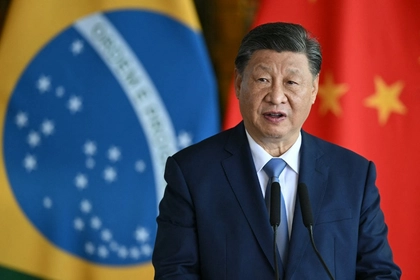During his recent visit to Southeast Asia, Ukrainian President Volodymyr Zelensky publicly accused China of aiding Russia’s effort to disrupt the June 15-16 Swiss Peace Conference.
“Russia, using Chinese influence in the region, using Chinese diplomats also, does everything to disrupt the peace summit,” said Zelensky, before adding that China supplied many of the components Russia has been using in its weapons against Ukraine.
JOIN US ON TELEGRAM
Follow our coverage of the war on the @Kyivpost_official.
China responded, without directly addressing the criticisms, by saying it never “fanned fire or fueled the flames” – a phrase commonly used by Beijing to describe its stance on the war in Ukraine – and that Beijing’s position on the peace conference has been “open and transparent.”
While China’s commercial supply of dual-use components to Russia is common knowledge, Zelensky’s tone and criticism nonetheless indicate a potential shift in Kyiv’s approach to China.
So, what has changed?
Kyiv’s past attitude toward Beijing
For a long time, Kyiv has worked hard to secure Beijing’s support, careful not to harshly criticize China’s friendship with Russia. It has also worked hard to get China on board with Zelensky’s peace plan, in general, and the Swiss conference, in particular.
On March 7, Ukraine’s Presidential Office Chief Andriy Yermak welcomed Beijing’s peace efforts during the “shuttle diplomacy” tour by China’s Special Representative for Eurasian Affairs Li Hui.

Xi Calls For ’More Voices’ to Work for Peace in Ukraine
“We value our partnership with China and hope that today’s talks will be another step towards deepening and strengthening our relations,” Yermak said in his opening remarks.
During Li’s visit, Ukrainian officials also raised the issues of components from “third countries” – not China – being found in Russian weapons, according to Kyiv’s official press release.
However, Kyiv is fully aware that there were components of Chinese origin found in Russian weapons.
Some have speculated that Kyiv’s attempts not to antagonize China are an attempt to avoid steering Beijing further toward Moscow.
“At a minimum, keeping China invested in seeking a solution is far better than the alternative in which it offers economic and material support to Russia,” read a 2023 commentary published by the Carnegie Endowment for International Peace.
The rationale behind Zelensky’s latest criticism
Zelensky’s comments might just have been a slip of the tongue, but it’s possible that Kyiv is reevaluating its approach toward Beijing.
One explanation is that Zelensky was trying to appeal to Southeast Asian nations, many of whom have their own ongoing territorial and economic disputes with China. By portraying Beijing alongside Moscow, Zelensky might be able to rally support from Southeast Asian nations as a message of solidarity.
The Philippines, for one, has disputes with China over its territorial waters in the South China Sea – or, depending on your political affiliation and interpretation, the West Philippine Sea within the South China Sea.
Alternatively, Zelensky might have been trying to align Kyiv’s stance with that of Washington towards China – the US has ramped up its criticisms of China’s support for Russia in recent days.
On May 1, the US introduced fresh sanctions against Russia, which included a large number of Chinese companies – to Beijing’s displeasure, unsurprisingly.
It is also possible that Zelensky has finally come to terms with the fact that Beijing was never on Kyiv’s side – and likely never will be, considering the growing ties between Beijing and Moscow, with Russian President Vladimir Putin often seen in warm embraces with Chinese President Xi Jinping and particularly, during his recent visit to China.
A Kyiv Post analysis also highlighted how Beijing’s contrasting attitude towards Kyiv and Moscow became apparent during Li’s European tour.
Whether Zelensky’s criticism of China represents an official shift in the Ukrainian government’s approach to Beijing remains to be seen – we wait for comments from officials from both sides.
Are Russia and China best buddies?
Officially, Beijing and Moscow have been growing ever closer since the latter’s full-scale invasion of Ukraine, but it’s not a friendship without issues.
The relationship is mutually beneficial – Russia is economically isolated by Western sanctions, and the Chinese economy offers Moscow a lifeline to sustain the country, with Beijing in a great bargaining position.
Russia gets commercial and military goods and trade revenues, and Beijing gets cheap gas and also trade revenues – on the face of it a win-win situation.
However, Beijing might also be overplaying its position.
On June 2, the Financial Times (FT) reported that China and Russia did not conclude a deal on the Power of Siberia 2 pipeline to transfer gas from Siberia to Northeastern China because China demanded to receive it at Russia’s subsidized domestic prices and that it would only purchase a small fraction of the pipeline’s planned annual capacity.
Does Putin have a choice though? Probably not.
The views expressed in this opinion article are the author’s and not necessarily those of Kyiv Post.
You can also highlight the text and press Ctrl + Enter






